Seasonal Safety Advice
We are committed to keeping everyone safe from fire and other emergency incidents. Below you can find safety advice to help you prevent these incidents from occurring.
Summer Safety
Whether you are in the garden or out camping, follow these tips to barbeque safety and avoid injuries or damage to property from fire-
- Make sure your barbeque site is flat and away from fences, trees, shrubs and sheds.
- Keep a bucket of water or garden hose nearby in case of emergencies.
- Never use petrol or paraffin to start or revive your barbeque – use firelighters or starter fuel on cold coals.
- Keep children, pets and garden games away from the cooking area.
- Never leave a barbeque unattended.
- Concentrate on what you are doing; it’s easy to get distracted when you have family and friends around.
- After cooking, make sure the barbeque is cool before moving it.
- Make sure ashes are cold before disposal.
- Remember, alcohol consumption increases the risk of accidents occurring.
Additional Tips for Gas Barbeques-
- Make sure your barbeque is in good working order.
- Make sure the gas tap is turned off before changing the cylinder and always disconnect the cylinder in open air.
- When you have finished cooking, turn off the gas cylinder before you turn off the barbeque controls – this ensures any gas in the pipework will be exhausted.
The impact of a fire can become even more serious when escape is either difficult or leads to a place of other danger, for example when fires occur on boats. Reduce the risk from fire by following these simple tips-
- Fit a smoke alarm. Test it each time you board. Optical sensor alarms are best for boats.
- Fit an appropriate fire extinguisher in the engine compartment and the cockpit locker.
- Fit a Carbon Monoxide alarm to BS EN 50291.
- Ensure furnishings, foam and insulation are fire retardant.
- Make a fire action plan and ensure your crew are aware of what to do if there is a fire.
- Contain and vent battery boxes.
If a fire occurs on the marina-
- If safe to do so, isolate gas and fuel supplies.
- Evacuate the craft and ensure all the crew are wearing lifejackets.
- Call NIFRS on 999.
- Stay out.
- Warn neighbouring craft.
If a fire occurs at sea-
- Only tackle a fire if it is safe to do so.
- Contact the Coastguard/NIFRS on 999.
- Identify position or give landmarks.
- Ensure all crew are wearing lifejackets.
- Prepare emergency grab bag (flares, VHF radio, compass) and life raft.
- If safe to do so, isolate gas and fuel supplies.
- Do not open the engine panel.
- Only as a last resort abandon ship.
Bonfires can pose a very real risk to public safety and property. There is no such thing as a completely safe bonfire. All fires have the potential to be dangerous, particularly in an uncontrolled environment where the following factors are not fully known, are difficult to assess and can change at any time:
- material used;
- weather conditions;
- environmental conditions;
- proximity and surrounding environment;
- human behaviour;
- supervision; and
- control measures.
NIFRS does not have any statutory duty or legislative powers to risk assess or inspect bonfire sites on behalf of individuals, organisations or statutory agencies. Therefore, we will not risk assess bonfires. The ultimate responsibility lies with the owner of the land on which the bonfire is built. NIFRS has no enforcement power in relation to the size and location of bonfires.
If agreement has been reached to build a bonfire, the landowner should consider the following guidance:
- Consult and inform any neighbours prior to having a bonfire.
- Be careful what materials are used in the bonfire, eg:
o damp material can cause excess smoke;
o tyres, plastics, paints and materials containing foam can produce large amounts of
smoke and toxic fumes;
o aerosols, cylinders and canisters may explode causing injury; and
o don’t throw any fireworks into the fire. - The bonfire should only be built in a clear open space to reduce the likelihood of fire spread by radiated heat.
- Petrol, paraffin or accelerants should never be used.
- Bonfires should be supervised at all times, with onlookers maintaining a safe distance.
- At any sign of danger, or in the event of an emergency, dial 999 and ask for NIFRS.
If you are attending a bonfire:
- keep a safe distance from the fire – especially children who should be supervised at all times;
- keep pets and animals away from the fire; and
- at any sign of danger, or in the event of an emergency, dial 999 and ask for NIFRS.
Remember, if we are tasked to a bonfire related incident, it is because someone from the local community has a concern and requires NIFRS assistance.
Whether you are heading off to a music festival or are spending a weekend outdoors, stick to these simple guidelines and keep your camping trip safe-
- Tents should ideally be pitched at least 6 metres apart from other tents.
- Keep a torch handy. Never light a candle or have any kind of flame burning apparatus in or near to a tent.
- Keep lighters and matches out of the reach of children.
- Always cook outside and well away from your tent, no matter how large. Cooking appliances should never be used in small tents. Make sure cooking appliances are stable and cannot be knocked over easily.
- Don’t cook near flammable materials or long grass.
- Store flammable liquids or gas cylinders away from the tent.
- Never smoke inside a tent.
- A fire can destroy a tent in 60 seconds so it is essential you have an escape plan and be prepared to cut your way out of the tent if there is fire.
- Make sure everyone knows what to do if their clothes catch fire – stop, drop to the floor and roll to put out the flames.
- If you do not have a mobile phone then find out where the nearest phone is located.
- Know the fire safety arrangements for the campsite.
Many of the same rules about fire safety in the home also apply to caravans and mobile homes.
- Park caravans and mobile homes at least 6 metres apart.
- Make a fire escape plan.
- If there’s a fire – get out, stay out and call NIFRS immediately.
- Make sure you can get out of a window if needed.
- Fit a smoke alarm and test it once a week.
- You should consider getting a fire extinguisher and a fire blanket, and know how to use them properly.
- Do not dry clothes on or right next to a heater.
- Make sure heaters are working properly – use a Gas Safe engineer to fix gas heaters.
- Turn gas off when not in use.
- Fit a Carbon Monoxide detector and keep air vents clear.
- Don’t overload sockets; an adapter with a lead is safer.
- Smoking inside can be dangerous, so smoke outside.
- Keep matches and lighters out of the reach of children.
- Never leave cooking unattended.
- Take extra care when cooking with hot fats and oils.
- Never put water on burning oil or fat.
- When not in use, fuel should be stored ideally six metres away from your caravan or mobile home and away from heat.
- Make sure everyone knows the caravan site’s fire safety arrangements.
Fire safety standards and fire evacuation procedures may be significantly different in other countries compared to the standards that you may be familiar with in Northern Ireland. When you arrive at your hotel or accommodation, you should plan how you and those you are with would evacuate if you discover a fire or if the fire alarm were to sound. You should familiarise yourself with the following-
- The fire instruction notice in your hotel room – usually located on the back of the door.
- Consider how you would leave the building by locating the nearest exit.
- Identify alternative exits to use if your nearest exit were to be blocked by fire.
- Walk the escape routes (including stairwells) from your room to familiarise yourself with them, ensure that they are clear and that they lead to a safe place outside the building.
- Familiarise yourself with how to raise the alarm should you observe any symptoms of fire. This will normally be via actuation of a break glass point. Many break glass points in other countries require you to push/pull a switch to activate the alarm after you have broken the glass in the call point.
- Rendezvous points – ensure all your family/party knows where to meet following an evacuation of your building.
Community Information Bulletin- Fire Safety Advice when Travelling Abroad
When the weather is warm, you may want to cool down in the water outdoors, but there are many hidden dangers that make some waterways unsafe for swimming.
- In the summer head to a lifeguarded beach, and swim between the red and yellow flags.
- Be aware that cold water can affect you physically and you can get ‘Cold Water Shock’.
- The water can also be deeper that you expect and often difficult to estimate the depth before you get in.
- There may be hidden currents.
- There may be hidden debris under the surface that you could get caught or tangled in.
- Before going into the water check to make sure that the conditions don’t exceed your ability. Swimming in open water is very different to swimming in a pool. Know your limits.
- When you enter, take a moment to acclimatise to the water temperature.
- Go with others and look out for each other. While you’re in make sure you have someone watching you and that they have a way to call for help.
- Wear a flotation device.
- Make sure your phone is charged so you can call for help if you come across anyone who needs it.
- If you see someone in difficulty in the water call for help, preferably a lifeguard if there is one nearby. Alternatively ring 999.
Many people accidentally drown in the UK each year and more than half of those people had no intention of entering the water.
What to do if someone falls into deep water:
- Call 999 to inform the emergency services. If you don’t have a phone, shout for help – but do not enter the water.
- Encourage the person in the water to try and float on their back and if there is
rescue equipment nearby, throw it to them. - Never enter the water to try and save someone. If you go into the water you are likely to suffer from cold water shock which will leave you unable to help, even if you are a strong swimmer.
What to do if YOU fall into deep water:
- If you fall into deep water, you should lie on your back and float.
- Fight the instinct to panic or swim- it’s better to just float.
- Lie back and keep your airways clear, push your stomach up and extend your limbs, moving hands and feet to help you float.
- Try to control the effects of cold water shock such as the gasping reflex. Once your breathing is controlled, call for help and, if possible, try making your way towards safety.
Don’t drink and drown:
- 20% of drowning victims have consumed alcohol before entering the water.
- Don’t let a night out end in tragedy; take a safe route home, away from water.
- Avoid walking near water even if the path is lit. You may not see trip hazards
or even the water’s edge in the dark. - If you’re with other people, stay with your group and don’t wander off if you become separated.
Safety advice for runners and walkers:
- Stick to proper pathways.
- Avoid walking or running near water in the dark.
- Don’t walk or run next to water if levels are high.
- Look out for trip or slip hazards – pay attention to your footing.
- When running or walking next to water, stay clear of the edges.
Every year, we are called to deal with large numbers of wildfires across Northern Ireland which are a serious risk to lives, property and the environment. We want everyone to enjoy the countryside and recommend the following fire safety tips to help prevent wildfires-
- Extinguish your cigarette and other smoking materials properly and don’t throw cigarette ends on the ground or out of car windows– take your litter home.
- Avoid using open fires in the countryside, it may seem a good idea but an open fire can easily get out of control.
- Don’t leave bottles or glass in woodland or grassland – sunlight shining through glass can start fires. Take them home or dispose in a waste or recycling bin.
- Keep children away from lighters, matches and open fires.
- Only use barbeques in a suitable and safe area and never leave them unattended.
- Ensure barbeques are fully extinguished and cold before disposing of their contents.
- Don’t attempt to tackle fires that can’t be extinguished with a bucket of water – leave the area as quickly as possible.
- If you see a fire in the countryside report it to the Fire & Rescue Service immediately on 999.
- If you see someone setting fires, report it to the PSNI.
- Keep fires as small as possible to prevent them getting out of control.
- Whilst there are benefits to controlled burning, NIFRS would remind land managers that it should only be used when all other methods of land management have been exhausted. This is due to the associated hazards and potential risk of starting a wildfire.
Community Information Bulletin- Controlled Burning and Wildfires
Winter Safety
- Have a working smoke alarm fitted on each level of your property. A working smoke alarm will give you and those you live with the vital time needed to escape in the event of a fire.
- Consider additional smoke alarms in the rooms you use the most.
- Test them weekly to make sure they are working.
- Make sure they can be heard by everyone throughout the house.
- Heat alarms are more suitable for kitchens.

- Carbon monoxide is a poisonous, colourless and odourless gas which can make you seriously ill and can be fatal.
- CO Alarms offer vital protection.
- Install in rooms with fuel burning heating.
- Get a gas safety check.
- Carbon monoxide awareness – Gas safety – HSE.
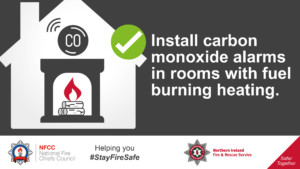
- Portable heaters can be a fire hazard.
- Make sure they are working properly.
- Do not place where they would block an escape route or be knocked over.
- Keep away from flammable materials e.g. paper, curtains, furniture, bedding.
- Unplug heaters when you go out or go to bed.
- Only use gas or paraffin heaters in a well-ventilated room – install a CO alarm in same room.
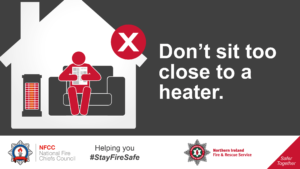
Help prevent chimney fires by following this advice:
- Do not overfill an open fire grate in case coals fall out.
- Always use a spark guard, and if you have young children or pets, consider using a safety guard.
- Make sure the fire is out before going to bed at night or leaving the house.
- Never interrupt the air supply by blocking air vents or air bricks.
- Ensure you use a suitably trained person to service your chimney or flue.
- Use the correct fuel for your fire or stove.
- Make sure logs and coal are stored correctly.
- Fit a carbon monoxide alarm in rooms with fuel burning appliances.
Community Information Bulletin- Chimney Fire Prevention
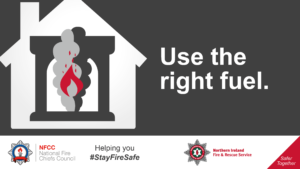
- Electrical items have the potential to overheat and start a fire in the home. Reduce this risk by switching off items when not in use, and don’t charge items longer than the manufacturers recommend.
- If you are using extra portable heaters during the winter months, make sure they are kept away from soft furnishings and Christmas decorations.
- Overloaded sockets can cause a fire due to overheating – use this Electrical Socket Calculator to check you aren’t overloading your sockets or extension leads.
- Check your Christmas lights are in good working order before using. Look for the BS Kite mark to ensure that your lights meet the appropriate standard.
- Always turn Christmas lights off before going to bed, or if you are leaving the house.
- If buying new electrical items look for the British Standard or CE mark to ensure equipment and chargers comply with UK or European Safety Standards.
- Don’t run appliances at night when the household is asleep.
- Don’t plug an extension lead into another extension.
- Don’t use electric blankets if there are signs of scorch marks. Also make sure to store them flat, and check them regularly for wear and tear, and avoid using a water bottle when already using an electric blanket as water and electrics don’t mix.

- Always make sure candles are in suitable holders.
- Keep well away from flammable items such as soft furnishings, decorations, Christmas trees and wrapping paper.
- Do not use in bedrooms or anywhere you may fall asleep.
- Put out candles when leaving the room, and before going to bed.
- Keep matches and lighters out of reach of children.
- Never leave candles unattended.
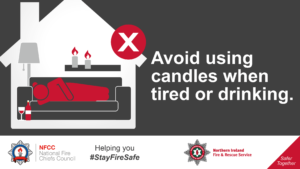
Smoking continues to play a significant factor in accidental house fire deaths so please make sure:
- Cigarettes are extinguished correctly and never smoke in bed, particularly if you have been drinking alcohol.
- Stub cigarettes out properly and dispose of them carefully.
- Smoke outdoors rather than indoors.
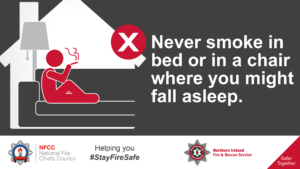
You may be entitled to a free Home Fire Safety Check if you or anyone living in your household:
- Are aged 50 or older;
- Have a disability or impaired mobility or;
- Receive assistance from a visiting Agency on a regular basis to help with day-to-day tasks.
You can apply for one here.
Community Information Bulletin- Christmas Fire Safety Advice
You can find more winter fire safety advice in our Winter Fire Safety Leaflet:
Halloween Safety
All fireworks intended to be sold to the public must be ‘CE’ marked showing that they meet EU requirements, and are clearly marked for their intended use – Indoor, Garden or Display-
- Keep fireworks in a sealed box or tin.
- Only use them one at a time, replacing the lid immediately.
- Read the instructions carefully, using a torch or hand lamp; never use a naked flame.
- Light fireworks at arm’s length using a taper or a firework lighter.
- Stand well back and never return to a firework after it has been lit as it could explode in your face.
- Never put fireworks in your pocket.
- Always supervise children around fireworks.
- Never throw fireworks.
- Keep all pets and animals indoors.
- Don’t set off noisy fireworks late at night and never after 11pm.
Sparklers are often viewed as being harmless but they do burn at fierce temperatures. To a young child, the heat from a sparkler is equivalent to the heat from a welding torch-
- Never give sparklers to children under five years old.
- Always wear gloves with sparklers, preferably leather ones.
- Ensure children hold sparklers at arm’s length and an adult lights it for them.
- Never wave sparklers near someone else as you could burn them.
- When the sparkler has finished, put it into a bucket of cold water straight away and leave it there.
If your child is wearing a fancy dress costume this Halloween-
- Avoid using a naked flame or candle in pumpkins; use a torch, glow stick or battery operated candle.
- Keep children away from any naked flames, including sparklers.
- Be sure they know how to ‘Stop, Drop and Roll’ if their clothing catches fire.
- Choose a costume and mask that doesn’t restrict a child’s visibility.
- Wear woollen tights or ‘heavy’ trousers, e.g., jeans, and a woollen jumper under the costume.
- Ensure your children are supervised at all times.
Community Information Bulletin- Halloween Fancy Dress Clothing
The added distractions at Halloween come with an increase in the likelihood of accidents. These simple tips can make Halloween a safe night for everyone-
- Remind children to be extra careful when crossing any roads.
- Choose a costume and mask that doesn’t restrict a child’s visibility.
- Provide children with a torch or glow stick as part of their costume.
- Avoid using a naked flame or candle in pumpkins; use a torch or battery-operated candle.
- Tell children to stay away from any naked flames. Be sure they know how to ‘Stop, Drop and Roll’ if their clothing catches fire.